The best gunfighters of the Wild West: Wild Bill Hickok - legend and reality
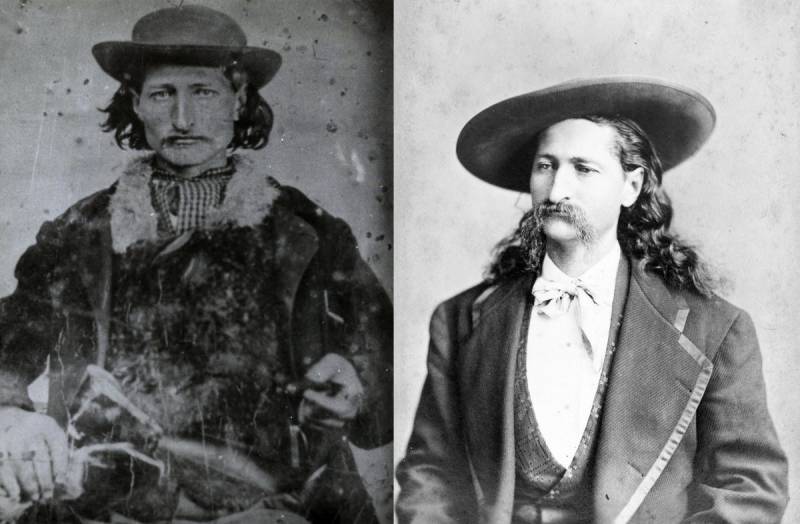
James Butler Hickok, better known as Wild Bill, became one of the greatest mythological figures of the American West during his lifetime and remains so today. Some American scholars of the period point out that the Wild West—that is, the Wild West as it has come to be thought of over the decades—actually began on July 21, 1865, when “Wild Bill” Hickok stood face to face with Davis Tutt. Both men drew pistols, but only Hickok escaped alive.
It was one of the most famous gunfights (called "cowboy duels"), and soon became legendary thanks to journalists whose stories about Hickok inspired countless duels to the death in novels and films. Wild Bill Hickok was considered a master of the quick retrieve weapons, also known as quick draw - the ability to quickly draw a pistol and accurately fire it at a target.
Hickok lived a fairly short life, which ended at age 39 when he was shot in the back. During those 39 years, Hickok helped his father run an Underground Railroad station, fought as a guerrilla in Missouri, went behind enemy lines as a scout and spy during the Civil War, drove carriages and wagons, led hunting parties, served as a detective for the U.S. government, and searched for gold. , performed in a traveling stage show with Buffalo Bill Cody, gambled, and served as a lawman in Hays and Abilene, Kansas. He demonstrated unsurpassed skill in shooting a revolver for that time.
How true were the legends about "Wild Bill" Hickok? Who was he - a hero and adventurer or a murderer and bandit? We will try to answer these questions in this material.
A little about justice in the Wild West
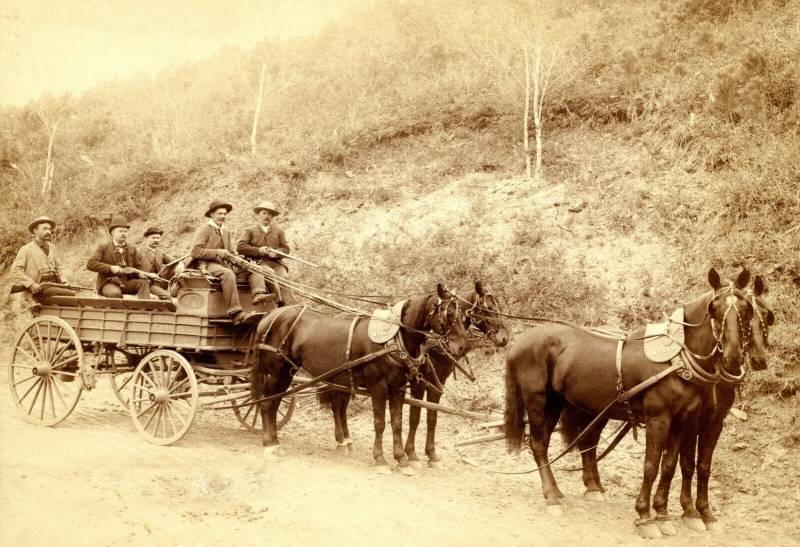
Before starting the story directly about Wild Bill Hickok, I would like to draw attention to what justice was like in the Wild West (or in the American Old West) in the second half of the XNUMXth century. There are many legends about lawlessness in the Wild West, which is not surprising, given that the endless expanses attracted many who wanted to profit.
Since 1848, people with an insane thirst to get rich have been moving into the “golden states” of California and Nevada. After the Mexican War in 1840, the California Golden State, as well as Texas and New Mexico, became part of the United States. It was then that the flow of people to these lands increased. Half of the settlers sought to escape all restrictions of society and the law. Among them, the number of adventurers, unencumbered by family or national ties and without strong morals, increased. Thanks to these people, the western territories received the name “wild” [2].
Four types of crimes were considered the most serious in the Wild West: cold-blooded murder, rape, horse theft and cattle theft. In 1854, the National Anti-Horse Thief Association began to gain strength, and after Glidden's invention of barbed wire in 1874, cattle rustlers were forced to turn their efforts to robbing banks and trains.[2]
In the story of the famous writer Bert Harte, “What Happened at the Fund,” we can read how Mr. Richard was completely “attacked,” but he refused to go to the police: “This is my own business, and it seems to me that I can handle it myself.” him, without recourse to the California Revised Code and to the sheriff's authority" [5]. This small fragment illustrates the attitude of the then residents to justice [2].
The reputation of many of the marshals, who were appointed in each district and who were the only representatives of power in the United States capable of enforcing the decisions of the federal government, was quite dubious. The hero of this article, Wild Bill Hickok, who was also a court marshal for some time, holding this position, also had a reputation as a gambler and a fan of fatal shootings, and he himself was put on trial more than once.
For this reason, it can be noted that representatives of the law in the West have often not been good citizens. The same can be said about sheriffs. Quite often, sheriffs failed to cope with their tasks due to the fact that their patrimony contained vast territories. Even with assistants it was difficult to do this. Let us not forget that representatives of the law had to intervene in clashes between large and small ranchers, between farmers and ranchers, US citizens and immigrants from other countries. In Texas alone, about a hundred lawmen were killed in the ten years from 1869 to 1878 [2].
But if a cold-blooded killer became sheriff, many wondered whether it was worth disturbing the order. The paradox of the West is that the best sheriffs were calculating killers. Soft-hearted sheriffs were often killed or continued to commit robberies under their noses. Tough and cruel lawyers were feared.
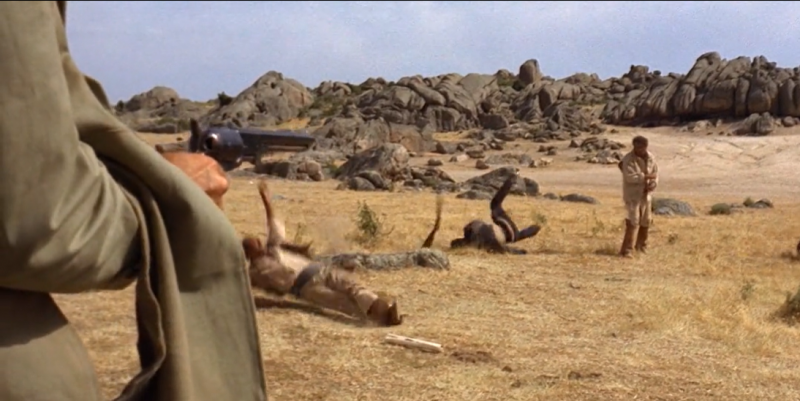
Still from Sergio Leone's film "The Good, the Bad and the Ugly"
That is, the most effective sheriffs were gunfighters - citizens who acquired a reputation as dangerous people with weapons and participated in numerous shootouts. Nowadays, such people are usually called “shooters,” but the terms gunman, pistoleer and gunfighter were more authentic for that time. The term gunfighter appears in newspapers from the 1870s and was used into the XNUMXth century.
These facts about legality and justice in the Old West should be kept in mind when considering such a controversial figure as Wild Bill Hickok.
The Early Years of James Hickok
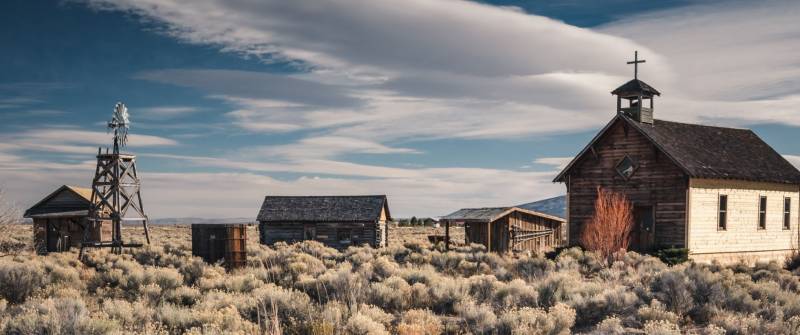
James Butler Hickok was born on May 27, 1837 in Homer, Illinois, the son of farmer William Alonzo Hickok and his wife Polly Butler. William Hickok had English roots. James was the fourth of six children. From a young age he was a good shot and gained local recognition as a marksman with a pistol.
In 1855, at the age of 18, James Hickok fled Illinois after a fight with Charles Hudson in which both fell into a canal; each of them mistakenly believed that they had killed the other. Hickok moved to Leavenworth in the Kansas Territory, where he joined Jim Lane's Free State Army, an anti-slavery group operating in the new territory during the era of Bleeding Kansas. Here he met 12-year-old William Cody (later known as "Buffalo Bill"), who, despite his youth, served as a scout in the U.S. Army during the war in Utah just two years later.[3]
From 1858, Hickok used the name of his late father, William Hickok, and during the American Civil War, the name William Haycock. Most newspapers called him William Haycock until 1869.
In 1865 he was arrested for using the name Haycock. After this, he returned to his name, James Hickok. Military records after 1865 list him as Hickok, but note that he was also known as Haycock. After the McCanles incident (more on that later), he grew a mustache, and in 1861 began calling himself “Wild Bill.”
Historian Joseph Rosa notes that those who served with him or knew him well claimed that Hickok's nickname was due to his actions against Confederate guerrillas and his exploits as a scout and spy.
In 1860, Hickok was seriously wounded by a bear while leading a freight team from Independence, Missouri, to Santa Fe, New Mexico. He was bedridden for four months, after which he went to Rock Creek Station in the Nebraska Territory to work as a groom. There, a freight company built a stagecoach stop along the Oregon Trail near Fairbury, Nebraska, on land purchased from David McCanles.[4]
On July 12, 1861, David McCanles came to the Rock Creek Station office to demand payment from station manager Horace Wellman for overdue property. McCanles threatened Wellman, and either Wellman or Hickok, who was hiding behind a curtain, killed him [1]. Hickok, Wellman and another employee, J. W. Brink, were put on trial for McCanles' murder, but it was decided that they had acted in self-defense. McCanles may have been the first person Hickok killed.[1]
Hickok subsequently visited McCanles' widow, apologized for the murder, and offered her $35 in restitution—all the money he had on him at the time.
Wild Bill Hickok becomes a legend
After the outbreak of the Civil War in April 1861, Hickok enlisted in the Union Army (Federal Army) in Sedalia, Missouri. After he was discharged for unknown reasons in September 1862, James joined General James Henry Lane's Kansas Brigade.
In late 1863, Hickok worked for the Southwest Missouri State Marshal as a member of the Springfield Detective Police. His duties included identifying and counting the number of uniformed soldiers drinking while on duty, checking hotel liquor licenses, and tracking down people who owed money to the Union Army.
He later resigned and General Sanborn, who commanded the district, hired him as a scout. Hickok received five dollars a day and was provided with a horse and equipment. Subsequently, the general wrote that he was the best man he had [1]. In June 1865, Hickok retired and went to Springfield, where he gambled.
In "Stories Greene County, Missouri, 1883." Wild Bill Hickok has been described as “a rude man by nature... a drunken, cheeky guy who loved to scare nervous men and timid women when he was “on edge” [6].
In Springfield, Hickok met Davis C. Tutt, a former Confederate soldier who had expired (or deserted) and was a well-known gambler. On July 20, 1865, they quarreled over a game of cards, leaving Hickok in debt to Tutt, who took his expensive Waltham watch as collateral. Tutt, according to subsequent stories, stated that the next afternoon he would display Hickok's clock in the Public Square, to which Hickok replied that if he did so, it would come down to shooting.[7]
At 6 pm on July 21, Tutt appeared with a watch and Hickok advised him not to cross the square. In response, Dave pulled out a pistol and opened fire on him. Hickok also pulled out a pistol and fired, and, according to several witnesses, both shots sounded like one. Dave missed, but Hickok's bullet hit him in the heart [7]. Tutt shouted: "Guys, I'm killed!", after which he lost consciousness and died [8]. This duel was recognized as the first of its kind.
Citing the original coroner's report into the death of Davis C. Tutt at the hands of James B. Hickok, historian Joseph Rosa notes that neither Hickok nor Tutt wanted to shoot each other, and it is still a matter of speculation why Dave targeted Hickok your gun. Witnesses said friends of both men spent several hours the morning and afternoon of July 21 trying to convince Dave not to confront him over the watch. Tutt agreed and said he didn't want any trouble, but after drinking, he left and later appeared outside the courthouse, ready to cross the square.[7]
The doctor, after examining Tutt's body, stated that the bullet from Hickok's pistol entered the fifth rib on the right side and exited through the fifth rib on the left side, passing through the heart. Tutt and Hickok were 75 yards apart when they opened fire, meaning Hickok's reputation as a marksman was well founded. Hickok used a Colt 1851 Navy Revolver.
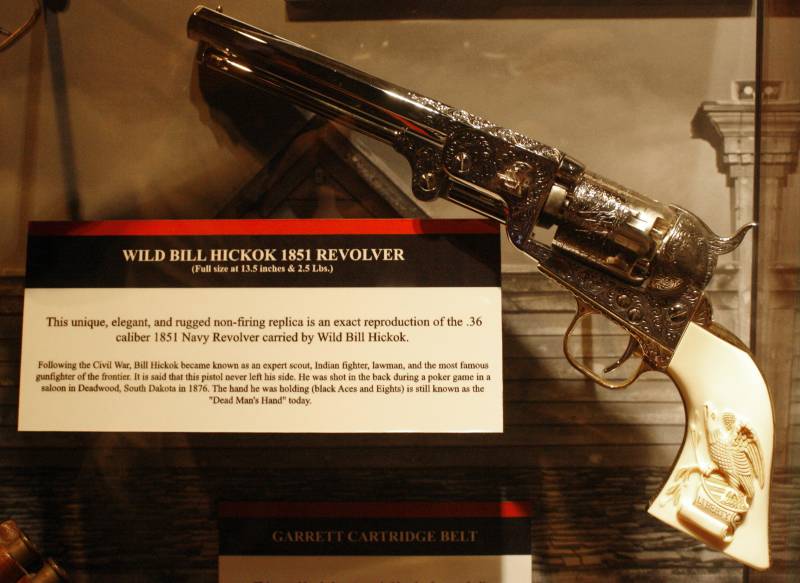
Hickok's weapon of choice was a pair of Colt 1851 Navy Model cap revolvers. They had ivory handles and a nickel plated finish. Wild Bill carried his revolvers with the handle forward on his belt or belt (when wearing street clothes) and rarely used a holster; he took out pistols in the “reverse” or cavalry manner.
Wild Bill was arrested and charged with murder, but the charge was later reduced to manslaughter. At his trial, he was found not guilty; the jury found that he acted in self-defense. From then on, Hickok's reputation as a gunfighter was firmly established. Journalists began to create legends about him, and soon an article by George Ward Nichols was published, which said that Wild Bill Hickok “killed hundreds of people.”
- said George Ward's most famous article.
After leaving Springfield, Hickok was recommended for the position of deputy marshal at Fort Riley, Kansas. This was the time of the Indian Wars, during which Hickok occasionally served as a scout in General George Custer's 7th Cavalry Division.[3] In December 1867, newspapers reported that Hickok had come to live in Hays City, Kansas. He became a deputy U.S. marshal and on March 28, 1868, took in 11 Union Army deserters accused of stealing government property.
On September 1, 1868, Hickok was in Lincoln County, Kansas, where he was hired as a scout for the 10th Cavalry. On September 4, Hickok was wounded in the leg while rescuing several cattlemen in the Bijou Creek basin who were surrounded by Indians.
In July 1869, Hickok returned to Hays and was elected town marshal of Hays and sheriff of Ellis County, Kansas, in a special election held on August 23, 1869.
James Butler Hickok Sheriff
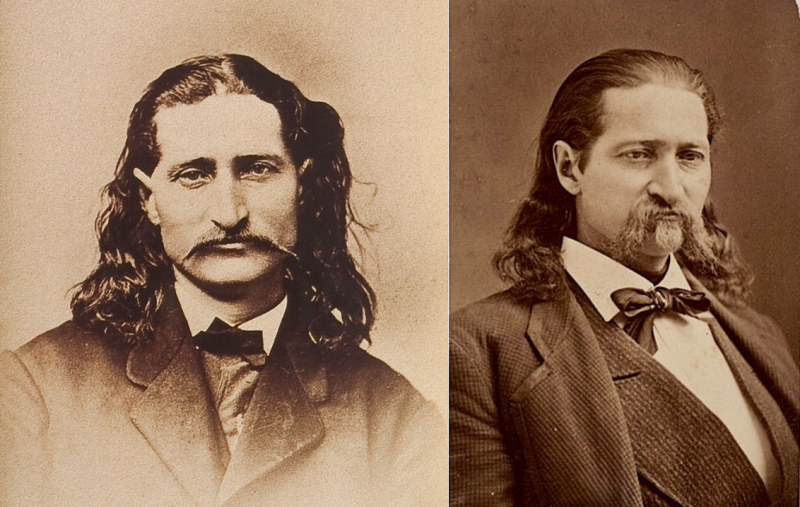
In September 1869, during his first month as sheriff, Hickok killed two people. The first was Bill Mulvey, who drunkenly rode around the city, shooting mirrors and whiskey bottles behind bars. The townspeople warned Mulvey to behave himself since Hickok was the sheriff. In response, Mulvey angrily declared that he had come to town to kill Hickok.
Seeing Wild Bill, he pointed his cocked rifle at him. Hickok waved his hand towards the intended spectators and shouted: "Don't shoot him in the back, he's drunk." Mulvey turned his horse to face those who might shoot him from behind, and before he realized he had been tricked, Hickok shot him in the temple.[3]
The second man Hickok killed was cowboy Samuel Strawn, who caused a disturbance in a saloon at 27 a.m. on September XNUMX when Hickok and his deputy Lanihan arrived on the scene. After a verbal altercation, Wild Bill killed him with a shot to the head. At the coroner's inquest into Strawn's death, despite "highly conflicting" witness accounts, the jury found the shooting justified.
On July 17, 1870, Hickok was attacked in a saloon by two soldiers of the US 7th Cavalry, Jeremiah Lonergan and John Kyle. Lonergan pinned Hickok to the ground and Kyle put a gun to Hickok's ear. When Kyle's weapon misfired, Hickok shot Lonergan, wounding him in the knee, and shot Kyle twice, killing him.
On April 15, 1871, Hickok became marshal of the city of Abilene, Kansas. He succeeded Tom Smith, who was killed while executing an arrest warrant on November 2, 1870. In early 1871, outlaw John Wesley Hardin, also known as a gunfighter in the Wild West, arrived in Abilene at the end of a cattle drive. In his autobiography, he wrote that he allegedly became friends with Hickok and apparently had a high opinion of him [7].
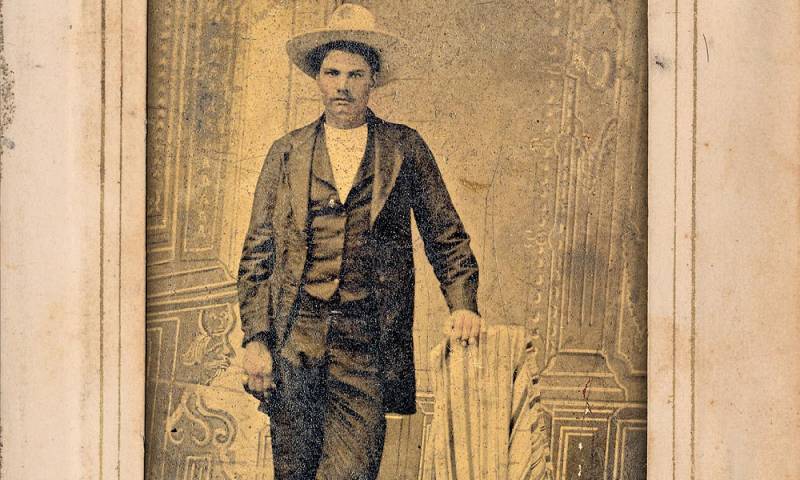
Hickok later said that he did not know that "Wesley Clemmons" (as John Wesley Hardin showed up in town) was Hardin's alias and that he was a wanted criminal. During a meeting with "Clemmons" (Hardin), he told him to give up his gun because he was carrying it in violation of city regulations, and Hardin complied. Additionally, Wild Bill advised Hardin to stay out of trouble in Abilene.
Hardin met Hickok again during a cattle drive in August 1871. This time, Hickok allowed Hardin to bring his pistols into town, something he never allowed others to do. Hardin soon committed the murder of Charles Cooger in a hotel in Abilene because he was snoring loudly (he fired several bullets into a common wall, trying to wake him up, but one of the bullets hit Cooger in the heart), after which he hurried to flee the city, because believed that Wild Bill would not arrest him, but would kill him to strengthen his reputation [9].
In addition, in his autobiography, Hardin writes that the owner of the Bull's Head Saloon, Phil Coe, allegedly tried to incite Hardin (while he was in town) to kill Hickok. Hoping to intimidate Hickok, Coe stated that he could kill a crow in flight. Wild Bill Hickok's answer has become one of the most famous sayings in the West (though probably apocryphal):
In October 1871, during a street shootout (versions of what started the shooting vary), Hickok killed Phil Coe. After shooting at Coe, he saw someone running toward him and quickly fired two more shots, accidentally shooting and killing Abilene Special Assistant Marshal Mike Williams, who was coming to his aid. This was the last time Hickok was involved in a firefight.
Hickok was relieved of his duties as marshal less than two months after the incident.
The Hickok murder and new legends about it
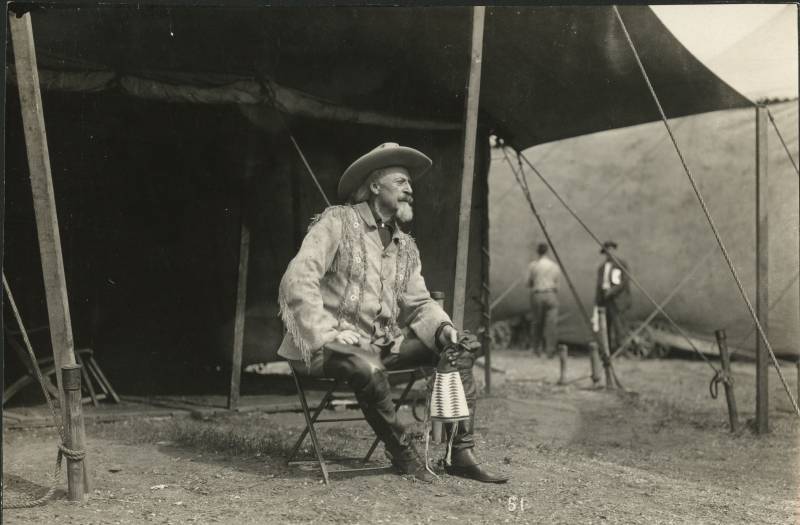
William Frederick Cody, nicknamed Buffalo Bill
In 1873, Buffalo Bill Cody invited Hickok to join his theater troupe. Hickok did not like performing and often hid behind the scenery. In one performance, he shot a spotlight as it focused on him. He worked in the group for only a few months.
In 1876, Hickok sought help from an eye specialist in Kansas City, Missouri. The exact diagnosis has not survived, but Lucien Howe's ophthalmology librarian at Harvard Medical School, Charles Snyder, noted: “Granular conjunctivitis, ophthalmia, trachoma—call it what you will—were common on the western frontier. James suffered from it" [1].
On August 1, 1876, Hickok was playing poker at Nuttal & Mann Saloon No. 10 in Deadwood, Dakota. When a seat became available at the table, a drunken man named Jack McCall sat down to play. And he lost big. Hickok suggested that McCall quit the game until he covered his losses and offered to give him money for breakfast. Although McCall accepted the money, he was apparently offended.
The next day, Hickok played poker again. He usually sat with his back to the wall so that he could see the entrance, but when he joined the game, he had to sit with his back to the door because there were no other empty seats. He twice asked the other man at the table, Charles Rich, to change places with him, but Rich refused.
McCall soon entered the saloon, approached Hickok from behind, pulled out his Colt Model 1873 Single Action Army .45 caliber revolver and shouted "Damn you! Get it!” shot Hickok in the back of the head.
Wild Bill died instantly. The bullet passed through his right cheek and struck another player, riverboat captain William Massey, in the left wrist. At the time of his death, James Hickok was holding a combination of cards (three aces and two eights of black suits), which later became known as the “dead man's hand.”
It is not known for certain what motives motivated Jack McCall - either he was offended for the “breakfast money”, or (according to his own statement) he was taking revenge on Hickok for the murder of his brother. How accurate the information about his brother's murder was is not clear - a man named Lew McCall was indeed killed by an unknown lawman in Abilene, Kansas, but there is no evidence that he was related to Jack McCall.
One of the witnesses at the trial, who had known McCall since childhood, claimed that he did not have a brother. It was this testimony, as well as the testimony of eyewitnesses, that convinced the jury of McCall's guilt, and he was sentenced to death.[10]
After Hickok's death, his figure became surrounded by even more legends than during his lifetime. One of the creators of these legends was former journalist J. W. Buell. Buell published his first book about Hickok in 1880. It was called "The Life and Amazing Adventures of Wild Bill, Scout." The book was so popular that its sequel, Heroes of the Plains, appeared the following year.
Although Buell characterized his work as “true history,” his novels were little more than stories reworked from an apocryphal article by George Ward Nichols and supplemented with a few new myths invented by Buell himself.[10]
In one of Buell’s novels, Hickok appears as the supposed “tamer of the West,” as a man who “brought civilization to a lawless region,” which, of course, had a very distant relation to reality.
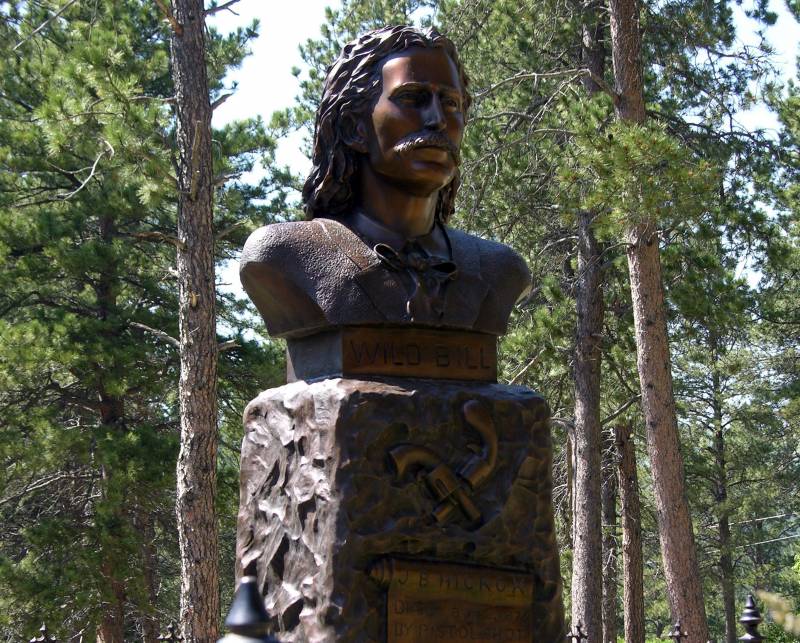
To summarize, it should be noted that from a modern point of view, James Butler Hickok was not a good citizen and in the modern world would be considered not a hero, but a criminal. But Wild Bill lived in a different era, in a territory with completely different orders and laws.
He was a man of his time and acted in accordance with the worldview and perception of the world that was characteristic of the people of that period. Therefore, it would be wrong to evaluate it from the point of view of our era.
From the point of view of the order established in the Wild West in the second half of the XNUMXth century (as was mentioned at the beginning of the material), Hickok cannot be unambiguously called either a cold-blooded killer or a bandit.
Использованная литература:
[1]. Rosa, Joseph G. They called him Wild Bill: the life and adventures of James Butler Hickok. University of Oklahoma Press, 1979.
[2]. Baranova P. E. Justice in the Wild West in the second half of the XNUMXth century. [Electronic resource] URL: https://cyberleninka.ru/article/n/pravosudie-na-dikom-zapade-vo-vtoroy-polovine-xix-veka.
[3]. Harry James. Guns of the gunfighters. Los Angeles: Petersen Pub. Co., 1975.
[4]. Kelsey, DM Our Pioneer Heroes and Their Daring Deeds. Kessinger Publishing. 1885.
[5]. Garth B. What happened at the foundation. 1876. [Electronic resource] URL: http://az.lib.rU/b/bretgart_f/text_1876_chto_sluchilos_na_fonde-oldorfo.shtml.
[6]. The Killing of David Tutt, 1865. Springfield, Greene County, Missouri. History of Greene County, Missouri. Western Historical Company, 1983. [Electronic resource] URL: http://files.usgwarchives.net/mo/greene/bios/t3000004.txt.
[7]. Rosa, Joseph G. Wild Bill Hickok: The Man and His Myth. Lawrence: University Press of Kansas, 1996.
[8]. Nichols, George Ward (February 1867). "Wild Bill" Harper's New Monthly Magazine, February 1867. Vol. 34, no. 201.
[9]. John Wesley Hardin. The Life of John Wesley Hardin, As Written by Himself. Seguin, Texas: Smith & Moore, 2011.
[10]. Sonneborn, Liz. Wild Bill Hickok. New York, Infobase Publishing, 2011.
Information